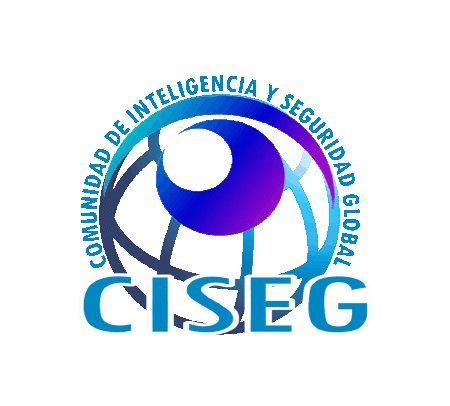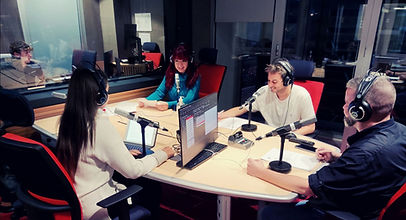


WELCOME TO
GLOBAL THREAT
CISEG | RADIO 4
podcasts
1. Tecnología y sociedad
Estamos en la generación en la que muchas de las horas que interactuamos con el exterior es a través de las redes sociales. Jóvenes y no tan jóvenes pasando muchas horas en el móvil, trabajando y estudiando a través del portátil, aplicaciones que te facilitan supuestamente la vida, conexiones wifi en todas partes que facilitan estas interacciones... ¿pero es tan bonito e inocente como parece? ¿Qué hay detrás de todas estas aplicaciones? ¿Nos pueden escuchar desde el móvil? ¿Qué medidas básicas de prevención deberíamos conocer?
Entrevista a: Vicente Aguilera Diaz. Ciberanalista y co-fundador de IsecAuditors.
2. Secuestros de menores
En los últimos años nos hemos acostumbrado a leer en los periódicos denuncias de menores desaparecidos. De acuerdo con los datos oficiales del Centro Nacional de Desaparecidos, el 65% de las desapariciones en España son menores. A veces estas desapariciones pueden ser fugas o expulsiones del hogar, pero en otras ocasiones, pueden ser secuestros. ¿Qué motivación hay detrás? ¿Qué Perfil? ¿Qué podemos hacer para prevenirlo
Entrevista a: Francesc Xavier Álvarez Llaberia. Criminólogo y Mosso d'Esquadra.

_JPG.jpg)


3. Pornografía infantil
El material de explotación sexual infantil, también conocido como pornografía infantil, reporta más de 20 millones de casos anuales y se estima que más de 750 mil personas están involucradas en esta actividad criminal. ¿Cuál es la situación en nuestro país? ¿Existe un perfil de quien produce, distribuye o consume? ¿Cómo son sus víctimas y qué consecuencias sufren? ¿Hay alguna forma de prevenirlo?
Entrevista a: Dr. Miguel Ángel Soria Verde. Psicólogo y profesor de Psicología Jurídica, Penal y Criminología Avanzada en la Universidad de Barcelona. Director del Máster de Perfilación Criminal UB.
4. Siria después de Daesh
Existen dos fechas claves para Siria en los últimos años: 2011 y 2014. Primavera Árabe y DAESH. ¿Qué repercusión han tenido en la balanza de poder sobre el terreno desde el momento en que comienzan a operar en el país? ¿Es posible la reconstrucción física y emocionalmente del país y de los sirios? ¿Los refugiados sirios recibieron el mismo trato por parte de Europa que los que están recibiendo los ucranianos?
Entrevista a: Gabriel Garroum. Graduado en Ciencias Políticas y de la Administración.
5. Rusia y Ucrania,
un grito, dos trincheras
El pasado 24 de febrero de 2022, un pretexto que nos evoca el pasado, desnazificar un territorio, hizo que la paz en el Centroeuropa se fracturara, ya que Rusia inició una invasión en Ucrania. ¿Podría haberse evitado esta guerra? ¿Era previsible? ¿Cuáles son los motivos reales para realizar la invasión? ¿Qué riesgos representa por Europa este conflicto? ¿Y cuándo devolverá la paz? ¿Provocará cambios en las políticas de seguridad y defensa europeas?
Entrevista a: Jesus M. Pérez. Analista de seguridad y defensa.
6. Homicidas: ¿qué hay
detrás del homicidio?
Entre todos los delitos violentos, sin duda el homicidio es uno de las conductas criminales que más atención generan en la opinión pública. Es una conducta criminal llena de aristas respecto al tipo de agresores implicados, sus fines y modus operandi. ¿Qué hay detrás del homicidio? ¿Qué motivos existen para cometerlo? ¿Qué sabemos sobre las víctimas? ¿Realmente tenemos asesinos seriales en nuestro país o más bien son homicidios únicos? ¿Cómo trabaja la policía para hacer frente a esta problemática?
Entrevista a: Carlos Garcia Espejo, miembro de la Guardia Civil en el Área de delitos contra las personas y Licenciado en Criminología.



7. Suplantación de
identitat digital
Vivimos en un mundo hiperconectado, donde buena parte de nuestro tiempo estamos interactuando por medio de nuestros dispositivos. Como usuarios también estamos expuestos a peligros online, especialmente aquellos que afectan a nuestra privacidad, como la suplantación de identidad digital. Pero, ¿son conocidos o desconocidos quienes roban nuestras identidades? ¿A qué perfil de delincuentes nos enfrentamos? ¿Hay alguna forma de evitar esta suplantación de identidad virtual? ¿Qué debemos hacer si la padecemos?
Entrevista a: Selva Orejón. Experta en identidad digital y reputación.
8. ¿Somos una sociedad insegura?
El miedo al delito es un fenómeno estudiado desde hace varias décadas por la criminología y se refiere al temor o preocupación que las personas tenemos hacia el delito y los delincuentes. ¿La percepción de seguridad de la ciudadanía encaja con la cifra de delitos actual? ¿Cómo afecta a la seguridad objetiva y subjetiva en las políticas públicas de seguridad? ¿Qué hace que las personas nos sintamos más o menos seguras? ¿Qué son los estallidos de inseguridad? ¿Cómo combatirlos?
Entrevista a: Anna Almécija Casanova i Francesc Guillén. Criminólogos. Miembros del Departamento de Interior. Presidente y Vicepresidente de la Asociación Catalana para la Prevención de la Inseguridad a través del Diseño Ambiental


9. Acoso escolar
El acoso escolar, más conocido como bullying, hace referencia a la victimización que puede producirse entre iguales en entornos escolares. Se estima que siete de cada diez niños/as sufren alguna forma de acoso o ciberacoso en España. ¿Cuáles son las motivaciones y el perfil de los agresores en el acoso escolar? ¿Y las víctimas? ¿Cómo saber que un chico/a está en un proceso de acoso? ¿Qué hacer? ¿Cuál es el papel del criminólogo como profesional en la prevención del acoso en las escuelas?
Entrevista a: Victoria Fernández Cruz. Criminóloga Forense, responsable de la vocalía de criminología forense del Col·legi Oficial de Criminologia de Catalunya.
10. Pasado, Presente y
Futuro de Afganistán
Nuestra invitada de hoy dice que las personas que nacen en países en guerra no tienen nombres ni apellidos. Este país se ha visto sometido a numerosas crisis y han impactado directamente sobre su población. ¿Cómo es la vida de las mujeres en Afganistán? ¿Qué cambios han sufrido con el nuevo gobierno Talibán? ¿Cómo luchar por la Paz? ¿Son los campos de refugiados tal y como los imaginamos aquí en occidente?
Entrevista a: Nadia Ghulam. Educadora Social y activista por la Paz. Autora de “Soñando la Paz. Una mirada femenina en el nuevo Afganistán de los talibán”.


11. ¿Confiamos en la
policía?
¿La ciudadanía confía en la policía? ¿Cuáles son los factores que aumentan o disminuyen esta confianza en nuestro país? ¿Qué modelos policiales tienen un buen recibimiento social?
Entrevista a: Tomás Gil. Inspector Jefe de la Policía Local. Asesor de Alcaldía en Seguridad Ciudadana y Civismo.
12. Delitos contra el
patrimonio
¿Realmente suceden delitos patrimoniales en nuestro país? ¿Alguno en especial? ¿Tenemos suficientes recursos para combatirlos? ¿Qué perfil y modus operandi poseen estos individuos? ¿Cuándo dinero mueve todo? ¿Podemos ayudar a prevenirlos?
Entrevista a: Marc Balcells, Experto e investigador en delitos contra el patrimonio cultural y su inserción en la delincuencia transnacional e internacional. Profesor de Derecho en la Universitat Oberta de Catalunya.

.jpg)
13. Seguridad Infantil
¿Cómo es una escuela segura y qué hacen los expertos que se dedican a esta labor? ¿Cómo saber si la escuela a la que llevamos a nuestros niños/as es segura? ¿Cuál es el nivel de seguridad de las escuelas infantiles catalanas?
Entrevista a: M. Ángeles Miranda Martinez. Vicepresidenta de la Asociación Nacional de Seguridad Infantil y consultora en prevención de accidentes infantiles.
14. La Unidad Hospitalaria Psiquiátrica Penitenciaria (UHPP)
Internationally, there is widespread recognition of the high percentage of inmates with mental health issues. The Penitentiary Psychiatric Hospital Unit, located at the Brians 1 Penitentiary Centre, is a pioneering model at the national level that provides care for all inmates who require psychiatric attention. Who does it serve? What are its inmates like? Discover the daily life of the unit.
Interview with: Dra. Gema Escuder. Psychologist and Neuropsychologist.
.jpg)
.jpg)
15. Terrorismo y mediación: recosiendo heridas
¿Es posible perdonar un acto terrorista? ¿Cómo se preparan estos encuentros? ¿La población conoce estos procesos restaurativos? Presentamos la obra de teatro "la mirada del otro", un espectáculo que permite a la sociedad acercarse a una dura realidad por medio de un reencuentro entre una víctima y un terrorista.
Entrevista a: Tomás Gil. Inspector Jefe de la Policía Local. Asesor de Alcaldía en Seguridad Ciudadana y Civismo.
16. Prevención de la radicalización violenta
a través del deporte
Is it possible to prevent radicalisation through tools like sport? Move IN Involved Sport is a socio-educational programme created by EDUVIC · Escola Itinere for social inclusion and the prevention of radicalisation in young people and adolescents through sport.
Interview with: Jordi Serra. General Coordinator of the Move IN Involved Sport Socio-Educational Project. Graduate in Physical Activity and Sports Sciences.
.jpg)
.jpg)
17. La Dark Web
What is the Dark Web? Can everyone access it? What are the risks? What crimes are most commonly committed there? How is crime prevented in this virtual environment?
Interview with:Steven Kemp. Postdoctoral Researcher at Pompeu Fabra University. Expert in trends, victimisation, and prevention of economic cybercrime.
18. El suicidio: cuáles son
las señales de alerta?
Is suicide more common now than in previous years? What are the warning signs? Are younger age groups more affected? What is the role of schools in detection and prevention? What can we do if we or a family member show signs of suicidal thoughts?
Interview with: Miriam Vilaplana. Psychologist. Coordinator of CSMA, HD, SRC, and ADI Garraf. Sant Joan de Déu Health Park.
.jpg)
.jpg)
19. El Psicópata integrado (parte I)
What is psychopathy? Do socially integrated psychopaths exist? What professions are they most attracted to? How can they be identified? Can an integrated psychopath evolve into a violent one?
Interview with: Dr. Cuquerella Fuentes. Head of the Forensic Psychiatry Department at the Institute of Legal Medicine and Forensic Sciences of Catalonia.
20. El psicópata violento
(parte II)
Are there forms of crime related to psychopathy? What is the Dark Triad of personality? Can we detect a violent psychopath? Are there early indicators to identify them? We discuss some real cases.
Interview with: Dr. Cuquerella Fuentes. Head of the Forensic Psychiatry Department at the Institute of Legal Medicine and Forensic Sciences of Catalonia.
.jpg)
21. Entre la pluma y el peligro: un periodista secuestrado por terroristas
Marc Marginedas was kidnapped for six months by jihadist terrorists. What is life like after such an experience? What tools did he use to survive that barbarity? Who is behind these kidnappings?
Interview with: Marc Marginedas. War Correspondent.
22. Víctimas de la yihad negra del Daesh
El libro "Víctimas de la yihad negra del Daesh" dan voz a algunos de los supervivientes que han querido prestar testimonio para explicar la realidad de miles de personas, para que sus historias traspasen las alambradas de los campos de refugiados que les acogen y las fronteras de sus países.
Entrevista a: David Garriga y Ilham Majure Kandalaft.


23. Delitos de odio LGTBIQ+
¿Qué son los delitos de odio hacia la comunidad LGTBIQ+? Qué retos y obstáculos presenta este colectivo hacia esta problemática? ?Qué han sido los adelantos legislativos? ¿Con qué medidas y políticas contamos para prevenir su victimización? ¿Qué papel juega la criminología, las instituciones y la sociedad en la lucha contra la LGTBIfòbia?
Entrevista a: Virgina Ávila. Criminóloga especializada en violencias machistas.
24. Víctimas indirectas del Daesh, las madres y padres de jóvenes radicalizados
¿Cómo terminó su hijo en manos de un reclutador? ¿Qué cambios vio su madre en él durante el proceso de radicalización? ¿Qué hacen las instituciones para evitarlo? ¿Cuál es el trato de las instituciones hacia estos padres?
Entrevista a: Dominique Bons, presidenta de la asociación Syrien Ne Bouge Agissons.
.png)

25. La Red Europea de Prevención de la Delincuencia
The European Crime Prevention Network aims to connect local, national, and European levels to promote the exchange of knowledge and practices in crime prevention among EU member states. Did you know that criminologists are working within the European Crime Prevention Network?
Interview with: Carles Soto-Urpina, criminologist.
.png)




